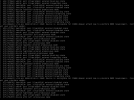Hi
My server is DL380p gen8 server, and I did read about and test various solutions but ALL of them failed.
I must admit that most of them are about GPU passthrough, and I just need to passthrough my p420i controller from proxmox to truenas (and a sas hba later).
So is there any proven way to do it? or we have to deal with it as is ?!
Thank you
My server is DL380p gen8 server, and I did read about and test various solutions but ALL of them failed.
I must admit that most of them are about GPU passthrough, and I just need to passthrough my p420i controller from proxmox to truenas (and a sas hba later).
So is there any proven way to do it? or we have to deal with it as is ?!
Thank you


